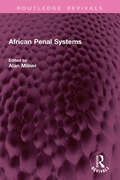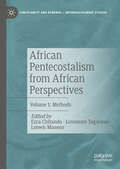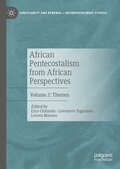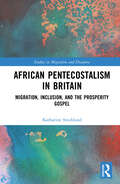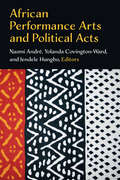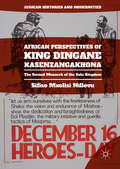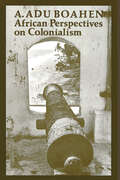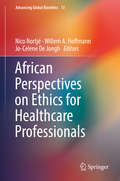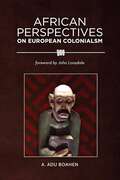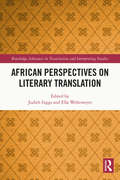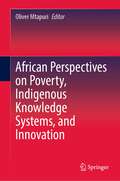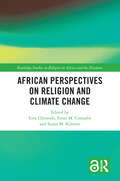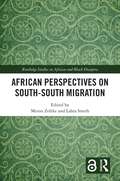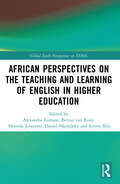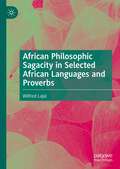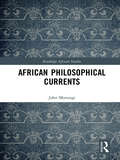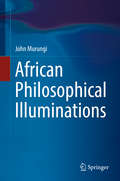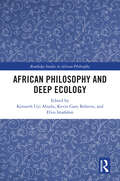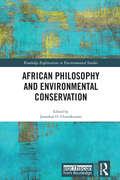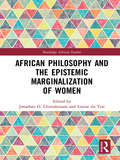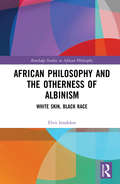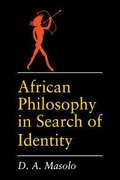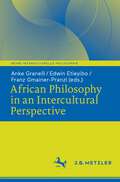- Table View
- List View
African Penal Systems (Routledge Revivals)
by Alan MilnerFirst published in 1969, African Penal Systems is the first book to explore the problems of African criminology. Sixteen distinguished contributors- sociologists, lawyers, and psychiatrists- each an authority on some aspect of African penal problems, have collaborated to produce it. Its first part gives a general survey of the penal systems of some fourteen African countries, variously English, French, or Portuguese inclined, or wholly autochthonous. Part two includes six specialist contributions on various detailed problems in the development and operation of the modern African systems.In his introduction Alan Milner, describes the sociological forces responsible for the increase of crime in Africa and examines the possibility of the growth of a peculiarly African approach to the solution of its penal problems. This is a must read for scholars and researchers African Studies, criminology, and African Law.
African Pentecostalism from African Perspectives: Volume 1: Methods (Christianity and Renewal - Interdisciplinary Studies)
by Lovemore Togarasei Ezra Chitando Loreen MasenoAlthough African scholars have made a significant contribution to the study of African Pentecostalism, very few studies have reflected on their output. Most of the contemporary publications on the widespread phenomenon of African Pentecostalism create the impression that only scholars from the Global North have contributed to the field. This volume addresses the lacuna in the available scholarship by undertaking detailed analyses of how African scholars from diverse academic disciplines and African/Diasporan context have helped to shape the field. The included chapters provid fresh data on new themes and perspectives in the field.
African Pentecostalism from African Perspectives: Volume 2: Themes (Christianity and Renewal - Interdisciplinary Studies)
by Lovemore Togarasei Ezra Chitando Loreen MasenoThis book makes a significant contribution to the study of African Pentecostalism, by reflecting on their output. Deviating from the widespread phenomenon of scholars from the Global North being dominant voices on African Pentecostalism, this volume brings together African scholars from diverse academic disciplines and African/Diasporan to showcase how they’ve helped to shape the field. This volume addresses the lacuna in the available scholarship by undertaking detailed analyses of how scholarship and exemplifies the various areas where African scholars have made and continue to make contributions. The included chapters engage in methodological debates on African Pentecostalism from the continent as well as from African diaspora, and is a must read for scholars working on Pentecostalism.
African Pentecostalism in Britain: Migration, Inclusion, and the Prosperity Gospel (Studies in Migration and Diaspora)
by Katharine StocklandBased on ethnographic research among African Pentecostal Christians living in the UK, this book addresses themes of migration and community formation, religious identity and practice, and social and political exclusion. With attention to strained kinship relationships, precarious labour conditions, and struggles for legal and social legitimacy, it explores the ways in which intimacy with a Pentecostal God – and with fellow Christians – has been shaped by the challenges of everyday life for Africans in the UK. A study of religious subjectivity and the success of the so-called ‘prosperity’ gospel, African Pentecostalism in Britain examines the manner in which the presence of God is realised for believers through their complex and often-fraught relationships of trust and intimacy with others. As such, it will appeal to sociologists and anthropologists with interests in migration and religion.
African Pentecostals in Catholic Europe
by Annalisa ButticciCatholic Italy is a destination for migrants from Nigeria and Ghana, who bring their own form of Christianity-Pentecostalism, the most Protestant of Christian faiths. At the heart of Annalisa Butticci's ethnography is a paradox. Believers on both sides are driven by a desire to find sensuous, material ways to make the divine visible and tangible.
African Performance Arts and Political Acts (African Perspectives)
by Yolanda Covington-Ward Naomi Andre Jendele HungboAfrican Performance Arts and Political Actspresents innovative formulations for how African performance and the arts shape the narratives of cultural history and politics. This collection, edited by Naomi André, Yolanda Covington-Ward, and Jendele Hungbo, engages with a breadth of African countries and art forms, bringing together speech, hip hop, religious healing and gesture, theater and social justice, opera, radio announcements, protest songs, and migrant workers’ dances. The spaces include village communities, city landscapes, prisons, urban hostels, Township theaters, opera houses, and broadcasts through the airwaves on television and radio as well as in cyberspace. Essays focus on case studies from Cameroon, the Democratic Republic of the Congo, Nigeria, Senegal, South Africa, and Tanzania.
African Perspectives of King Dingane kaSenzangakhona: The Second Monarch of the Zulu Kingdom (African Histories and Modernities)
by Sifiso Mxolisi NdlovuThis book examines the active role played by Africans in the pre-colonial production of historical knowledge in South Africa, focusing on perspectives of the second king of amaZulu, King Dingane. It draws upon a wealth of oral traditions, izibongo, and the work of public intellectuals such as Magolwane kaMkhathini Jiyane and Mshongweni to present African perspectives of King Dingane as multifaceted, and in some cases, constructed according to socio-political formations and aimed at particular audiences. By bringing African perspectives to the fore, this innovative historiography centralizes indigenous African languages in the production of historical knowledge.
African Perspectives on Colonialism (The Johns Hopkins Symposia in Comparative History #15)
by A. Adu BoahenThis history deals with the twenty-year period between 1880 and 1900, when virtually all of Africa was seized and occupied by the Imperial Powers of Europe. Eurocentric points of view have dominated the study of this era, but in this book, one of Africa's leading historians reinterprets the colonial experiences from the perspective of the colonized. The Johns Hopkins Symposia in Comparative History are occasional volumes sponsored by the Department of History at the Johns Hopkins University and the Johns Hopkins University Press comprising original essays by leading scholars in the United States and other countries. Each volume considers, from a comparative perspective, an important topic of current historical interest. The present volume is the fifteenth. Its preparation has been assisted by the James S. Schouler Lecture Fund.
African Perspectives on Ethics for Healthcare Professionals (Advancing Global Bioethics #13)
by Nico Nortjé Willem A. Hoffmann Jo-Celene De JonghThis book focuses on ethical issues faced by a variety of healthcare practitioners across the Anglophone African continent. This important resource contains in-depth discussions of the most salient current ethical issues by experts in various healthcare fields. Each profession is described from both an African and a South African perspective, and thus contributes to dialogue and critical thinking around African ethics and decision-making. In this way the book provides readers with an understanding of the ethical issues at hand in various professions, including the practical implications of the ethical issues and how to address those effectively. This is a beneficial resource for all those involved in the various healthcare professions addressed in this book, including undergraduate students, lecturers, researchers and practitioners across the continent. Simply put, with the dynamic changes and challenges in healthcare across the globe and in Africa, this is an indispensable resource for healthcare practitioners.
African Perspectives on European Colonialism
by John Lonsdale A. Adu BoahenIn this book, one of the pioneers of twentieth century African history examines the perceptions and responses of Africans to European colonialism of the late nineteenth and early twentieth century. This edition of Boahen's text, originally published in 1989, is contextualized in a new foreword by John Lonsdale, updating some of Boahen's findings and interpretations while maintaining that the "best, totally unambiguous, legacy of this republication would surely be the inspiration of a new generation of African scholars, locally based, as clear-minded and outspoken as Adu Boahen himself.
African Perspectives on Literary Translation (Routledge Advances in Translation and Interpreting Studies)
by Judith Inggs Ella WehrmeyerThis collection serves as a showcase for literary translation research with a focus on African perspectives, highlighting theoretical and methodological developments in the discipline while shedding further light on the literary landscape in Africa. The book offers a framework for understanding key approaches and topics in literary translation situated in the African context, covering foundational concepts as well as new directions within the field. The first half of the volume focuses on the translation product, exploring such topics as translation strategies, literary genres, and self-translation, while the second half examines process and reception, allowing for an in-depth look at agency, habitus, and ethics. Each chapter is structured to allow for the introduction of a given theoretical aspect of literary translation followed by a summary of a completed research project with an African focus showing theory in practice, offering a model for readers to build their own literary translation research projects while also underscoring the range of perspectives and unique challenges to literary translation work in Africa. This unique volume is a key resource for students and scholars in translation studies, giving visibility to African perspectives on literary translation while pointing the way forward for future research directions.
African Perspectives on Poverty, Indigenous Knowledge Systems, and Innovation
by Oliver MtapuriThis book examines the connections between poverty and innovation in Africa. Through case studies and theorizations from a distinctly African perspective, it stands in contrast to current theoretical works in the field, which remain very much rooted in Western-orientated thinking. The book investigates the application of methodologies which explain numerous African contexts in connection with issues of poverty and inequality. It reflects on comparative practices and praxes on the African continent, including commonplace traditions and practices in alleviating poverty, taken against a background of the failure of current prescriptions for poverty alleviation, such as the Structural Adjustment Programmes (SAPs) and the Poverty Reduction Strategy Papers (PRSP). There is a dire need for new practical perspectives which move Africa forward using its indigenous knowledge. Owing to a general lack of recorded African theories and methodologies on poverty, inequality and innovation, this book represents a pioneering corpus of African knowledge addressing poverty and inequality through local innovations. Adopting a transdisciplinary approach, it is relevant to students and scholars in development studies and economics, African studies, social studies, political history and political economy, climate studies, anthropology and geography.
African Perspectives on Religion and Climate Change (Routledge Studies on Religion in Africa and the Diaspora)
by Ezra Chitando, Ernst M. Conradie and Susan M. KilonzoThis book interrogates the contributions that religious traditions have made to climate change discussions within Africa, whether positive or negative. Drawing on a range of African contexts and religious traditions, the book provides concrete suggestions on how individuals and communities of faith must act in order to address the challenge of climate change. Despite the fact that Africa has contributed relatively little to historic carbon emissions, the continent will be affected disproportionally by the increasing impact of anthropogenic climate change. Contributors to this book provide a range of rich case studies to investigate how religious traditions such as Christianity, Hinduism, Islam, and indigenous faiths influence the worldviews and actions of their adherents. The chapters also interrogate how the moral authority and leadership provided by religion can be used to respond and adapt to the challenges posed by climate change. Topics covered include risk reduction and resilience, youth movements, indigenous knowledge systems, environmental degradation, gender perspectives, ecological theories, and climate change financing. This book will be of interest to scholars in diverse fields, including religious studies, sociology, political science, climate change and environmental humanities. It may also benefit practitioners involved in solving community challenges related to climate change.
African Perspectives on South–South Migration (Routledge Studies on African and Black Diaspora)
by Lahra SmithThis book investigates the diverse and dynamic forms of migration within Africa. It will be crucial reading for researchers, students, and policy makers with a focus on South-South Migration, Migration and Inequalities, Migration and Development, and Refugee and Humanitarian Studies.
African Perspectives on Trade and the WTO
by Patrick Low Chiedu Osakwe Maika OshikawaTwenty-first century Africa is in a process of economic transformation, but challenges remain in areas such as structural reform, governance, commodity pricing and geopolitics. This book looks into key questions facing the continent, such as how Africa can achieve deeper integration into the rules-based multilateral trading system and the global economy. It provides a range of perspectives on the future of the multilateral trading system and Africa's participation in global trade and underlines the supportive roles that can be played by multilateral and regional institutions during such a rapid and uncertain transition. This volume is based on contributions to the Fourth China Round Table on WTO Accessions and the Multilateral Trading System, which took place just before the World Trade Organization's Tenth Ministerial Conference in Nairobi in December 2015.
African Perspectives on the Teaching and Learning of English in Higher Education (Global South Perspectives on TESOL)
by Alexandra Esimaje Bertus Van Rooy ‘Demola Jolayemi Daniel Nkemleke Ernest KluThis book brings together the work of African scholars and educators directly involved in initiatives to improve the teaching and learning of English in higher education across Africa. Offering alternative perspectives across different African countries with examples of decolonised practice in research, the book provides a critical discussion and examples of successful practice in the teaching of English in Africa. Each chapter of the book reports on a specific context and a specific teaching and/or learning initiative in higher education, with emphasis on comparability of information and on clear evaluation and critical analysis of the intervention. The editors offer a thoughtful comparison of different methods, strategies and results to provide an authoritative reference to effective strategies for English teaching and learning. The book paints a cohesive picture of the field of English language teaching in Africa and will be of great interest to researchers, scholars and postgraduate students in the areas of applied linguistics, English teaching and comparative education.
African Philosophic Sagacity in Selected African Languages and Proverbs
by Wilfred LajulThis book explores African philosophic sagacity, or wisdom philosophy, as proposed by Odera Oruka in his “Four Trends in Current African Philosophy” (1981), which he later expanded to six trends (1998). Oruka defines philosophic sagacity as wisdom philosophy, or philosophy of the wise men of Africa who are independent, liberal and non-conformist thinkers, and who often deviate from the accepted common norms of their societies. This book takes philosophic sagacity discourse beyond Oruka’s definition by encompassing traditional wise sayings and proverbs. It combines individual liberal thinkers and the communal ideas, and cherishes both rational and emotional engagement, offering a broader understanding of African philosophic sagacity. Wilfred Lajul opens the door for new researchers to venture into the study of African languages, wisdom sayings, and proverbs, and helps to unveil the content of this philosophy from the perspective of different African societies.
African Philosophical Currents (Routledge African Studies)
by John MurungiThe history of the human world has reached a stage where no philosophical community can any longer philosophize in isolation from other philosophical communities. The African philosophical community is not an exception and neither is any other philosophical community. There is a widespread notion in the West that philosophy originated in Greece and found its way throughout Europe, from where it migrated to Africa. This book argues that Philosophy did not migrate to African from anywhere but that it is radically native to all communities. The chapters cover the erasure of African philosophy, African philosophical departures, the threat that Christianity has posed to African philosophy, African legal philosophy, African musical aesthetics and connections with classical philosophy. Arguing that the landscape of philosophy has a place not only for Africans but also for all human beings and that African philosophers are among the architects of this landscape, this book is an important read for scholars and students of African philosophy.
African Philosophical Illuminations
by John MurungiThe illumination of African philosophy offered in this volume leads to the illumination of philosophy in general. Illuminating arises as an essential task of philosophy, whether African or not. What is illuminated is not already there, but is constituted at the moment of illumination. This book invites the reader to participate in the illuminating work of philosophy and necessarily, thereby, to contribute to his or her own self-constituting self-illumination. Although the focus is on African philosophy, the book also bridges the gap between African philosophy and other branches. Today more than ever, a bridging philosophy is called for, and this book helps to meet that need. This book poses philosophical questions such as who is an African and what Africa is, and seeks philosophical answers. In doing so, it contributes to the ongoing discourse on African philosophy. It addresses such issues as the African grounding of philosophy, the difference between African and Black philosophy, the African body, African art as expressed in and by Chiwara, the plight of African trees as the plight of Africans, and the symbolic meaning of Robben Island.
African Philosophy and Deep Ecology (Routledge Studies in African Philosophy)
by Kenneth Uyi Abudu, Kevin Gary Behrens, and Elvis ImafidonThis book investigates African philosophical contributions to the concept of deep ecology, which advocates for rethinking human and non-human relationships within our ecosystems, by promoting the inherent and earned worth of all beings.With ecological crises impacting lives around the world, this book interrogates deep ecology thinking from African philosophical perspectives, highlighting the continent’s important ontological, epistemological, ethical, aesthetic, and broad philosophical contributions. The book investigates issues such as the eco-phenomenology of human / non-human animals’ relations, Ubuntu and the environment, the superiorist fallacy, environmental belongingness, the impact of colonization and modernity on non-human trauma, the politics of ecological narrative about African places, the question of moral status, African socialist perspectives, the question of degrowth, selective subordination, biodiversity loss, land ethics, the ontology of waste, and the concept of personhood in relation to global climate and ecological justice.Providing a significant intervention in our understanding of the ecological crises and our duties toward ecosystems and the non-human other in the twenty-first century, this book is an important read for researchers, advocates and other stakeholders working in the fields of environmental philosophy, climate change, indigenous studies, and African Studies.
African Philosophy and Environmental Conservation (Routledge Explorations in Environmental Studies)
by Jonathan O. ChimakonamAfrican Philosophy and Environmental Conservation is about the unconcern for, and marginalisation of, the environment in African philosophy. The issue of the environment is still very much neglected by governments, corporate bodies, academics and specifically, philosophers in the sub-Saharan Africa. The entrenched traditional world-views which give a place of privilege to one thing over the other, as for example men over women, is the same attitude that privileges humans over the environment. This culturally embedded orientation makes it difficult for stake holders in Africa to identify and confront the modern day challenges posed by the neglect of the environment. In a continent where deep-rooted cultural and religious practices, as well as widespread ignorance, determine human conduct towards the environment, it becomes difficult to curtail much less overcome the threats to our environment. It shows that to a large extent, the African cultural privileging of men over women and of humans over the environment somewhat exacerbates and makes the environmental crisis on the continent intractable. For example, it raises the challenging puzzle as to why women in Africa are the ones to plant the trees and men are the ones to fell them. Contributors address these salient issues from both theoretical and practical perspectives, demonstrating what African philosophy could do to ameliorate the marginalisation which the theme of environment suffers on the continent. Philosophy is supposed to teach us how to lead the good life in all its forms; why is it failing in this duty in Africa specifically where the issue of environment is concerned? This book which trail-blazes the field of African Philosophy and Environmental Ethics will be of great interest to students and scholars of Philosophy, African philosophy, Environmental Ethics and Gender Studies.
African Philosophy and the Epistemic Marginalization of Women (Routledge African Studies)
by Jonathan O. Chimakonam Louise Du ToitThis book examines the underexplored notion of epistemic marginalization of women in the African intellectual place. Women's issues are still very much neglected by governments, corporate bodies and academics in sub-Saharan Africa. The entrenched traditional world-views which privilege men over women make it difficult for the modern day challenges posed by the neglect of the feminine epistemic perspective, to become obvious. Contributors address these issues from both theoretical and practical perspectives, demonstrating what philosophy could do to ameliorate the epistemic marginalization of women, as well as ways in which African philosphy exacerbates this marginalization. Philosophy is supposed to teach us how to lead the good life in all its ramifications; why is it failing in this duty in Africa where the issue of women’s epistemic vision is concerned? The chapters raise feminist agitations to a new level; beginning from the regular campaigns for various women’s rights and reaching a climax in an epistemic struggle in which the knowledge-controlling power to create, acquire, evaluate, regulate and disseminate is proposed as the last frontier of feminism.
African Philosophy and the Otherness of Albinism: White Skin, Black Race (Routledge Studies in African Philosophy)
by Elvis ImafidonAlbinism is one of the foremost disability and public health issues in Africa today. It often makes headlines in local, national and international medias and forms the basis for intense advocacy at all levels. This is primarily due to the harmful representations of persons with albinism deeply entrenched in African traditions. These deeply rooted ideologies about albinism in African thought have largely promoted the continuous discrimination, stigmatization, harming, killing, commodification and violation of the human rights of persons with albinism in African places. How has albinism emerged as a thick concept in African traditions? What are these deeply entrenched ideas about the ontology of albinism in African thought? What epistemic injustice has been done to persons with albinism in Africa places? Why do harmful beliefs about albinism still persist in modern African societies? How does the African communalistic ethic justify the harm done against persons with albinism? What is the duty to, and burden of, care for persons with albinism? What peculiar existential challenges do persons with albinism in general and females with albinism in particular face in African societies and how can they be overcome? What can be learnt from the education philosophy of reconstructionism and genetic engineering in improving the wellbeing of persons with albinism? African Philosophy and the Otherness of Albinism: White Skin, Black Race digs deep into these philosophical questions revealing fascinating but latent aspects of how albinism is understood in African places as a necessary step to take in improving the wellbeing and integrity of persons with albinism in Africa today. This book will be of interest to scholars and students of African philosophy, sociology, African studies and disability studies.
African Philosophy in Search of Identity
by D. A. MasoloA Kenyan philosopher surveys themes and debates in African philosophy over the last five decades. Masolo's purview includes Francophone and Anglophone philosophers in both the analytic and phenomenological traditions.
African Philosophy in an Intercultural Perspective (Reihe Interkulturelle Philosophie)
by Anke Graneß Edwin Etieyibo Franz Gmainer-PranzlAfrican philosophy under the specific conditions of a colonial and postcolonial world is – at least since the 20th century if not even earlier – inherently intercultural. The aim and target of the volume is to reveal, interrogate and analyse the intercultural dimension in African philosophy, and to critically interrogate the project of an intercultural philosophy from an African perspective. This volume is the first publication that explicitly discusses African philosophy as a challenge to the project of intercultural philosophy.
